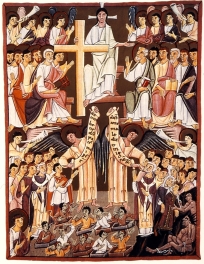It has taken a while but it is now agreed that my The Apocalypse in the Early Middle Ages is to published soon by Cambridge University Press. Happily, it seems that the book will come out simultaneously in paperback and hardback. The press have yet to set a release date – there’s some copy-editing needs doing first – but it’s all getting there.
To give a sense of the book’s coverage, here’s the running order:
Introduction: How the World Ends
Debating the Apocalyptic
A Question of Methodology
Overview
Chapter One: The End of Civilisation (c. AD 380 – c. AD 575)
The Eschatology of Empire
The Apocalyptic Other vs The Roman Empire
Millenarianism, AD 500, and the First ‘Crisis of the Year 6000’
The Coming Judgement
Conclusion
Chapter Two: The New Urgency (c. AD 550 – c. AD 604)
New Directions under Gregory the Great
Gregory of Tours’ Ecclesia Dei
Conclusion
Chapter Three: The Ends of Time and Space (c. AD 600 – c. AD 735)
Columbanus and the Ends of the Earth
Isidore’s Final Countdown and the Way Back to Millenarianism
The Heretical Bede
Conclusion
Chapter Four: Pseudo-Methodius and the Problem of Evil (c. AD 680 – c. AD 800)
A World Crisis and Pseudo-Methodius
The Early Reception of Petrus Monachus’ Translation
The Moral Use of Apocalypse
Chapter Five: Charlemagne, Pater Europae (c. AD 750 – c. 820)
The Rebirth of Empire
Counting to 6,000 Again
Heresy and the ‘Precursors of Antichrist’
Conclusion
Chapter Six: A Golden Age in Danger (c. AD 820 – c. AD 911)
Accumulated Apocalypticisms
The New Empire
Outsiders of the End Times
Conclusion
Chapter Seven: The Year 1000 and Other Apocalypticisms (c. AD 911 – c. AD 1033)
Counting to 1000
Adso and the Restabilisation of the West
The Rise of the Sibyls
Otto III and Imperial Spirituality
Wulfstan’s England in Crisis
Peace and Revolution in France
Conclusion
The End (c. AD 400-c. AD 1033)
What is the End?
Time
Imperial Apocalyptic
Outsiders, Identity and Reform
Apocalypse and Authority in the Early Middle Ages

